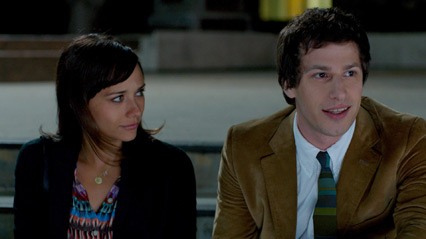

By Kim Voynar Voynar@moviecitynews.com
Sundance Review: Celeste and Jesse Forever
If you were hoping for Celeste and Jesse Forever, one of the most buzzed about titles going into Sundance this year, to be this year’s Like Crazy, you’re in luck. Beautifully written by Will McCormack and Rashida Jones (the writing debut for both actors), deftly directed by Lee Toland Krieger (The Vicious Kind), and effortlessly acted by Jones and Andy Samberg in the lead roles, Celeste and Jesse Forever is exactly the kind of gem you have to think buyers at Sundance will be salivating over. It’s charming, it’s touching, and it’s very accessible to a mainstream audience.
The film explores what happens when Celeste and Jesse (Jones and Samberg), who seem on the surface to be the perfect couple, decide to amicably divorce. All goes pretty well at first, so long as Jesse’s living in his artist’s studio behind the house and the pair are still hanging out every day. After all, they’re best friends, so why should they have to give that up just because they’re splitting up? Sure, their friends think it’s weird, but they’re doing them a favor, too, by not making them choose between them. What could possibly go wrong?
With a lesser script, this would play out in all kinds of lame cliches that would have had me inwardly groaning, but the arcs of both characters are so remarkably imagined and well-drawn that everything about Celeste and Jesse’s relationship felt very real – painfully real – to me. Having gone through a relatively amicable divorce and then the whole process of moving on into other relationships with my children’s father in the past couple years, there are certainly things about my personal life that I brought into watching this film play out. For me, the writing of the character of Celeste – this driven, in-control, strong woman who has to be “right” all the time, who fails to see and nurture the positive things about her relationship with Jesse until it’s too late to go back and fix what’s broken, was wrenching and real. I’ll say this: After the screening, there were lots of weepy-eyed, sniffly women in the rest room talking about how true this film felt to them.
I think of both Jones and Samberg more as comedic actors, and they certainly bring a level of playfulness to their respective roles that’s particularly effective in making the close friendship of these characters feel absolutely believable. But this script requires both actors to bring their dramatic chops as well, and they deliver on that front too. The supporting performances, particularly by Ari Graynor and Eric Christian Olsen as an engaged couple who are Celeste and Jesse’s best friends and McCormack as a likable pot dealer bemoaning the impact of medical marijuana on the economy of his drug dealing business, are also solid. Emma Roberts turns up as a flavor-of-the-month pop star who Celeste despises on principle but has to work with when her branding company takes her on as a client. There’s nothing at all wrong with Roberts’ performance here, and I’m delighted to see her in a project like this, but from a story standpoint this, for me, was a bit of a weak spot in terms of whether it really needed to be there. It’s a fairly harmless diversion, plot-wise, but it’s not what I’d consider an essential element of the storytelling. But that’s a small quibble for what’s overall quite an excellent film.
This is a very different kind of film than Krieger’s previous Sundance effort, The Vicious Kind (a film I still feel was vastly under-appreciated in its intelligence, depth and complexity). Nonetheless, you can see his particular style of storytelling in both films, in the way he has of getting his actors to dig under their skins and really find who these people are, and bringing them to life in a way that’s relatable. This is a superb job of direction. I do think there are a few places here and there where the film could still use a little tightening and tweaking (Krieger said in the intro that they just finished it a week-and-a-half ago), but there’s plenty of time to smooth out those few bumps before release if the film gets distribution – and I’d be surprised it if doesn’t. This one’s a winner.
















does anyone know if they get get back together…?